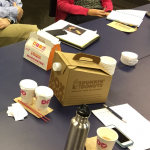You might not know this, but librarians at Hunter do a good bit of teaching. We manage hundreds of invited class sessions every semester as well as many sections of a semester long credit-bearing research course. We teach first year students and doctoral students and everything in between. We care about teaching well and we want to get better at doing it.
One thing we do to improve our teaching is set aside a dedicated time each month to get together with colleagues in our department and talk about it. We talk about successes in the classroom. We talk about challenges. We show off lesson plans, assignments, and results of class evaluations. We receive feedback, critiques, and encouragement.
It is not a frictionless process. Our department has a diverse array of librarians with a diverse array of experiences and perspectives about teaching. We do not always agree- and we like it that way. While a goal of the discussion group is to exchange ideas and encourage experimentation with new methods and technologies, we are not trying to produce a uniform model of instructional librarian. We see strength in our individual differences and understand that these differences will naturally lead to different styles of instructional practice.
We have been having these get-togethers for a little over a year now and we have accrued some practical wisdom to share in the form of some neat bullet points:
- Have coffee & donuts: there are a lot of meetings to go to at this university, reward your colleagues for spending time focused on teaching. If you have colleagues who can take turns providing baked goods- even better!
- Vary the schedule: while there is an appeal to having the monthly meeting at a set day and time, this may exclude a colleague who is always unavailable at that time. A varied schedule may give more people a chance to attend.
- Keep it loose, but have a plan: a little freedom helps facilitate free exchange of ideas- too much can lead to an unfocused kvetching session. Have a dedicated presenter or discussion leader. Circulate reflective questions ahead of time. Allow discussion to stray, but bring it back to the assigned questions when it wanders to far or for too long.
- Lastly, be patient and be flexible: as much as you want your colleagues to change on a certain point, they may want to change you. You may both benefit more from simply focusing on understanding the experiences and values that underlay your differences.
Are you a part of a teaching discussion group in your department? We would love to get together with your group sometime! Just drop a line to one of the subject liaisons to your department.




Comments are closed.